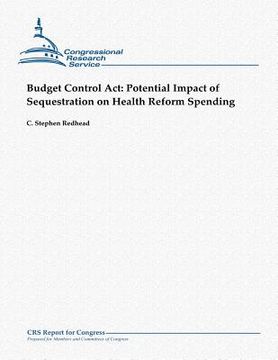Budget Control Act: Potential Impact of Sequestration on Health Reform Spending (en Inglés)
Reseña del libro "Budget Control Act: Potential Impact of Sequestration on Health Reform Spending (en Inglés)"
The Budget Control Act of 2011 (BCA; P.L. 112-25) established new budget enforcement mechanisms for reducing the federal deficit by at least $2.1 trillion over the 10-year period FY2012-FY2021. The BCA placed statutory limits, or caps, on discretionary spending for each of those 10 fiscal years, which will save an estimated $0.9 trillion during that period. In addition, it created a Joint Select Committee on Deficit Reduction (Joint Committee) with instructions to develop legislation to reduce the federal deficit by at least another $1.5 trillion through FY2021. On November 21, 2011, the Joint Committee announced that it was unable to agree on a legislative package of deficit cuts, which raises the likelihood of automatic annual spending reductions beginning in FY2013. Under the BCA, the reductions would be achieved by a combination of sequestration-an automatic across-the-board cancellation of budgetary resources (i.e., spending cuts) for nonexempt direct spending programs-and lowering the caps on discretionary spending. The potential impact of spending reductions triggered by the BCA on health reform spending under the Patient Protection and Affordable Care Act (ACA) would appear to be somewhat limited. ACA sought to increase access to affordable health insurance by expanding the Medicaid program and by restructuring the private health insurance market. It set minimum standards for private insurance coverage, created a mandate for most U.S. residents to obtain coverage, and provided for the establishment by 2014 of state-based insurance exchanges for the purchase of health insurance. Certain individuals and families will be able to receive federal subsidies to reduce the cost of purchasing coverage through the exchanges. The new law included direct spending to subsidize the purchase of health insurance coverage through the exchanges, as well as increased outlays for the Medicaid expansion. Under the rules governing sequestration, Medicaid spending would be exempt from any reduction, and cuts to Medicare would be capped at 2%. ACA also included numerous mandatory appropriations that provide billions of dollars to support temporary programs to increase coverage and funding for targeted groups, provide funds to states to plan and establish exchanges, and support many other research and demonstration programs and activities. These appropriations would, in general, be subject to direct spending reductions under a sequestration order. However, for any given fiscal year in which sequestration was ordered, only new budget authority for that year (including advance appropriations that first become available for obligation in that year) would be reduced. Unobligated balances carried over from previous fiscal years would be exempt from sequestration. ACA is likely to affect discretionary spending subject to the annual appropriations process. The law reauthorized appropriations for numerous existing discretionary grant programs and activities authorized under the Public Health Service Act, permanently reauthorized funding for the Indian Health Service (IHS), and created a number of new grant programs and provided for each an authorization of appropriations. In addition, the Congressional Budget Office projected that both the Department of Health and Human Services and the Internal Revenue Service will incur substantial administrative costs to implement the policies and programs established by ACA. Those costs will have to be funded largely through the annual appropriations process. ACA related discretionary spending would, in general, be subject to automatic spending reductions triggered by the BCA.

